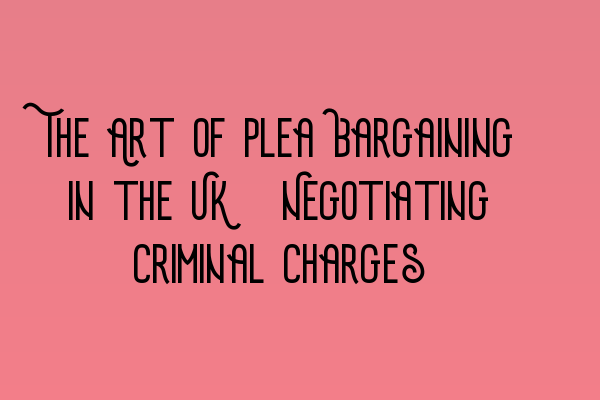The Art of Plea Bargaining in the UK: Negotiating Criminal Charges
Plea bargaining is an essential aspect of the criminal justice system in the UK. It is a negotiation process between the prosecution and the defence, aimed at reaching an agreement on the charges to be brought against the accused and the potential sentence. In this blog post, we will explore the intricacies of plea bargaining, its benefits and potential drawbacks, and the role of a solicitor in navigating this complex process.
Understanding Plea Bargaining
Plea bargaining involves a careful assessment of the evidence and the strength of the case by both the prosecution and the defence. The prosecution may wish to secure a guilty plea to avoid the costs and uncertainties associated with a trial, while the defence may seek to minimize the potential sentence or negotiate a lesser charge. It is worth noting that plea bargaining is not applicable to all criminal cases, particularly those involving serious offences that must be tried in higher courts.
One of the key benefits of plea bargaining is that it can lead to a faster resolution of criminal cases, saving valuable time and resources for both the court system and the parties involved. It allows for a more efficient use of the limited judicial resources and helps to alleviate the backlog of cases in the criminal justice system. Plea bargaining also gives defendants an opportunity to have a say in the charges they face and potentially minimize the impact on their future prospects.
However, plea bargaining is not without its controversies and potential drawbacks. Critics argue that it may result in innocent individuals pleading guilty to avoid the risk of harsher sentences, leading to miscarriages of justice. There is also a concern that plea bargaining can undermine the public’s confidence in the criminal justice system if it is perceived as a shortcut to justice or a way for defendants to escape full accountability for their actions.
The Role of a Solicitor
A skilled and experienced solicitor plays a crucial role in the plea bargaining process. They analyze the evidence, advise their clients on the potential consequences of different plea options, and negotiate with the prosecution on their behalf. A solicitor acts as a voice for their clients, ensuring their rights are protected and that any plea agreement reached is fair and in their best interests.
To successfully navigate the plea bargaining process, solicitors must possess excellent negotiating skills, legal knowledge, and a deep understanding of the criminal justice system. They need to carefully evaluate the strengths and weaknesses of their clients’ cases and assess the likelihood of securing a favorable plea agreement. This requires extensive research, preparation, and effective communication with both the prosecution and the defendant.
SQE 1 Practice Exam Questions | SQE 1 Practice Mocks FLK1 FLK2 | SQE 2 Preparation Courses | SQE 1 Preparation Courses | SRA SQE Exam Dates
Conclusion
Plea bargaining is a valuable tool in the UK criminal justice system, allowing for a more streamlined and efficient resolution of cases. It provides defendants with an opportunity to actively participate in their legal proceedings and potentially achieve more favorable outcomes. However, it is crucial for solicitors to approach plea bargaining with caution, ensuring that the interests and rights of their clients are protected throughout the process.
At SQE Criminal Law & Practice Law UK, our team of expert solicitors are well-versed in the art of plea bargaining. We understand the complexities of the criminal justice system and the importance of securing a fair and just outcome for our clients. Contact us today to discuss your case and benefit from our comprehensive legal expertise.
